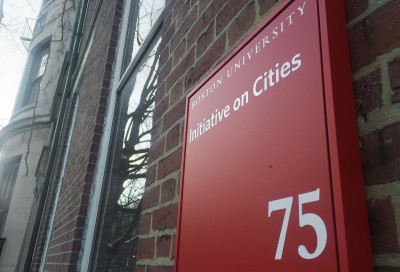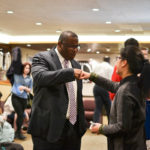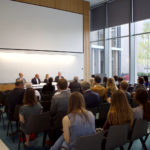
The Boston University Initiative on Cities released the 2015 Menino Survey of Mayors during the United States Conference of Mayors 84th Winter Meeting Wednesday. The survey is the only nationally representative survey of mayors that contains information on high-priority issues mayors face, according to the IOC’s statement.
Authored by David Glick and Katherine Einstein, professors in the Department of Political Science, the survey’s main goal is to inform citizens of the challenges mayors of large contemporary cities face, ranging from infrastructure problems to public safety.
IOC also welcomed to campus the first Mayor in Residence former Nashville Mayor Karl Dean Tuesday. IOC spokesman Conor LeBlanc said Dean’s role connects the academic and applied sides of urban studies.
Dean said he is ready to invest his experience in urban affairs into the future of U.S. cities.
“[Mayor in Residence] is an opportunity to reflect upon what work I did, but also to reflect upon the future of cities,” he said. “That is something that I care about very much and would like to really delve into it in a more academic sense — the issues that are confronting cities and how important cities are to the country.”
Dean will also serve as a political science professor, teaching a class this semester called “The Contemporary American City: Challenges and Opportunities.”
In regard to the survey, Einstein said this year’s survey explored several issues found in major metropolitan cities and highlighted many challenges mayors saw concerning.
“We hope to potentially help guide policy making and to get government officials to know what mayors are thinking about a wide array of important policy issues,” she said. “I imagine [the survey] would be helpful for Boston as well as other cities to know how mayors are trying to tackle these important policy issues.”
Einstein explained that the data was collected from 89 mayors of cities with populations of more than 100,000 in order to ensure the sample was representative of the nation.
Glick said the survey identified issues mayors from all over the nation face and has the potential to garner action that reaches a higher level of government.
“When the survey identifies issues that a lot of cities have in common, it might allow mayors and others who work in cities to, for example, go to the federal government or their state governments and say, ‘This is a common issue in cities. Let’s develop a program for this,’” Glick said.
Katharine Lusk, executive director of the IOC and editor of this year’s Menino Survey of Mayors, said surveying mayors is important in order to analyze the success of local government officials in comparison to those at the state or federal level. Lusk said the release of the second annual survey can improve BU’s reputation as an accredited research university.
“Part of our goal is to contribute to BU’s reputation for urban scholarship,” she said. “Having a high-profile survey that helps us understand the issues mayors face and how the BU community can help address them brings more attention to Boston University as an urban research university.”
The survey, initially named the 2014 Survey report, now bears the name of former Boston Mayor and IOC co-founder Tom Menino after his passing, according to information presented in the survey.
Several students said having the Mayor in Residence and the survey would be an invaluable resource for learning about urban issues on and off BU’s campus.
Dominick Troendle, a senior in Sargent College of Health and Rehabilitation Sciences, said mayors have the ability to impact cities and universities.
“If BU and the mayor work together on a social issue, I think the mayor’s voice would add influence,” Troendle said.
Shayna Bezozo, a freshman in the College of Communication, agreed that mayors are influential government officials.
“It’s important to hear what mayors have to say because they have a fair amount of power,” Bezozo said. “Mayors can help the student body by making their concerns more visible and maybe [actualize] a more enjoyable environment in the city.”
Amethyst Murillo, a sophomore in the Questrom School of Business, said she thinks the survey is a good way to unite mayors of various cities across the country.
“[The survey] is a good idea to hear what issues mayors of cities all over the country are dealing with,” Murillo said. “Maybe major cities can find common ground and work together to resolve the issues they share.”




